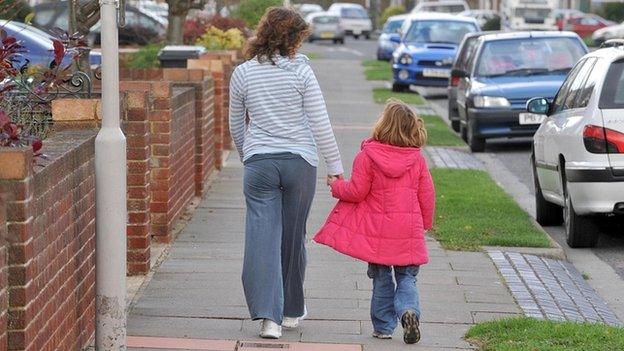The right to choose to home educate
- Published

There are many different reasons families prefer to educate children at home
Some stories have one or two major threads but home education is a tapestry of the decisions of tens of thousands of families made in different places or circumstances across the UK.
While councils are recording greater numbers there is no way of knowing whether some of that reflects a better understanding of home educating families.
Social media and access to a wide range of education material online may be making it easier for families to take on what is clearly a major commitment of time and energy.
There is a strong tradition in some rural areas of families organising themselves to help their children learn at home.
Others may arrive at the choice after an unhappy or difficult experience of their child not getting on well at school or not getting a place at their preferred school.
We don't have definitive data on what happens to home educated children, but there is no reason to think they can't do as well academically or otherwise as children who go to school full time.
That's partly because they are very likely to be the children of middle class, quite educated parents who are able to afford for one person to be at home.
Although it is a minority choice, home education does reflect reservations many parents will experience at some point about whether their child fits completely into a very structured school system.
Those reservations are not enough for the vast majority to ever step out of a system which is familiar, regulated and provides an immediate social network.
Home education also provokes uneasiness because by its nature it is outside the system, an alternative choice.
Local authorities have the power to intervene if there are concerns about a child's welfare, or ask for evidence if they are worried a suitable education isn't being provided.
But from time to time there are calls for greater monitoring or regulation.
The last major bout of this was in 2009 when the Badman review raised concerns that a lack of monitoring created opportunities for child abuse.
Plans for registration were dropped in the last stages of the Labour government amid strong opposition from home educating families.
Now another concern has emerged, that a small number of children may be at risk of being radicalised, or places in unregulated or illegal schools.
A government consultation is underway now on further regulation of anywhere teaching children for more than six to eight hours a week.
Perhaps in the light of the bruising arguments over implementing the Badman review the government has made clear it has no intention to intervene in the right to choose to home educate.
- Published1 June 2015
